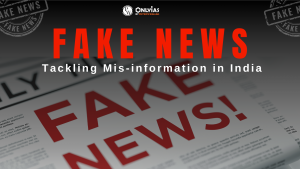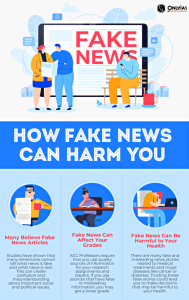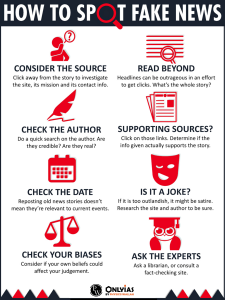
This article is based on an Editorial “Fake news and mis-information: Sections of the law that police can invoke” which was published in Indian express and there is an increase in cases related to the exploitation of social media for spreading mis-information and fake news. Recently, a TV anchor was booked by the Karnataka Police for spreading mis-information for political gains.
| Relevancy for Prelims: Fake News & False Information, International Fact-Checking Network.
Relevancy for Mains: The menace of fake news and false information, Social media and spread of fake news, Risks to privacy, free speech and spread of mis-information. |
About Fake News and False Information:
- It consists of false information presented as fact to manipulate people intellectually and emotionally sparking strong emotional responses and even violence.
- Disinformation and Fake News : It is understood as false information that is created or spread with the deliberate intent of causing harm.

The Dark Side of Dis-information and Fake News: Impact and Consequences
- Manipulating views of the Public: Fake News exposes people to biased information that confirms their existing beliefs, reinforcing their preconceptions and polarization of society.
- Economic Impacts: It can lead to market volatility and economic ramifications.
- As reported by the ICAR-Central Avian Research Institute, Fake news had a severe impact on the poultry industry, resulting in estimated losses of over $3 billion.
- Threat to Internal Security: False information is disseminated by non-state actors for radicalization and promoting propaganda.
- Role of Deep-fakes: Deepfakes are realistic-looking videos or images that have been manipulated to show something that did not actually occur.
- AI-generated Islamophobia: Deepfake images being used to hurt the sentiments of the Muslim community.
- Communal Disharmony and Social Division: Fake news has caused harmful incidents like mob lynching, communal riots, public and private loss of property due to the antisocial conduct of some people.
- Narrowing down media diversity: The Artificial algorithms favor specific news stories or sources, leading to narrowing of perspectives and reinforce inequalities and biases.
- Ex- During Donand Trump’s election.
- Privacy Violations: During pandemic, medical records of Covid-19 positive individuals were circulated online compromising their privacy.
Navigating the Legal Landscape of India’s Information and Digital Governance:
- Indian Penal Code (IPC) Section 153A criminalizes acts that promote hatred between different religious, racial, or linguistic groups, and actions.
- Section 69A of the Information Technology Act, 2000 blocks access to information online necessary in the interest of the safety and the security of the state.
- Disaster Management Act 2005 (DMA) deals with false warnings and fake news around a disaster leading to panic.
- Information Technology Rules (IT), 2021 regulates content by online publishers of news and social media intermediaries.
- Information Technology (Intermediary Guidelines and Digital Media Ethics Code) Amendment Rules, 2023 regulates fact checking of “false”, “fake” or “misleading” information related to the Union Government.
- Digital Personal Data Protection Bill 2023 has provisions to curb the misuse of individuals’ data on online platforms.
Way Forward: Battling Mis-information in India
- Verifying information Source: Media organizations should prioritize regular fact-checking and work on raising public awareness about the issue.
- Fact Checking Standards: India needs to develop a framework based on international best practices like the IFCN (International Fact-Checking Network) code of principles for fact-checking.
- Robust Legislative framework: It is needed to maintain a balance between free speech and protecting citizens from falling prey to malicious disinformation.

- Awareness Programs: Broader awareness campaign involving everyone to educate society about the laws and rules concerning fake posts and the harm they can cause.
- Capacity Building of Law Enforcement Agencies: India must take action against those who create and spread fake content.
- Regulation of Digital Media: Platforms like Facebook and Google in India announced the formation of an Information Trust Alliance (ITA) to combat fake content. It is the time to develop and strengthen this initiative.
Conclusion
India’s growing problem with false information has a detrimental effect on society, the economy, and security. Fact-checking, awareness campaigns, and law enforcement capacity building are all solutions to this issue. Addressing the issues brought on by false information in the digital era requires stepping up efforts in these areas.
![]() 16 Sep 2023
16 Sep 2023

